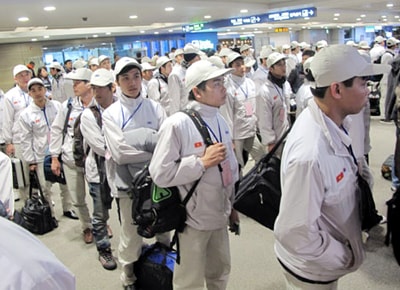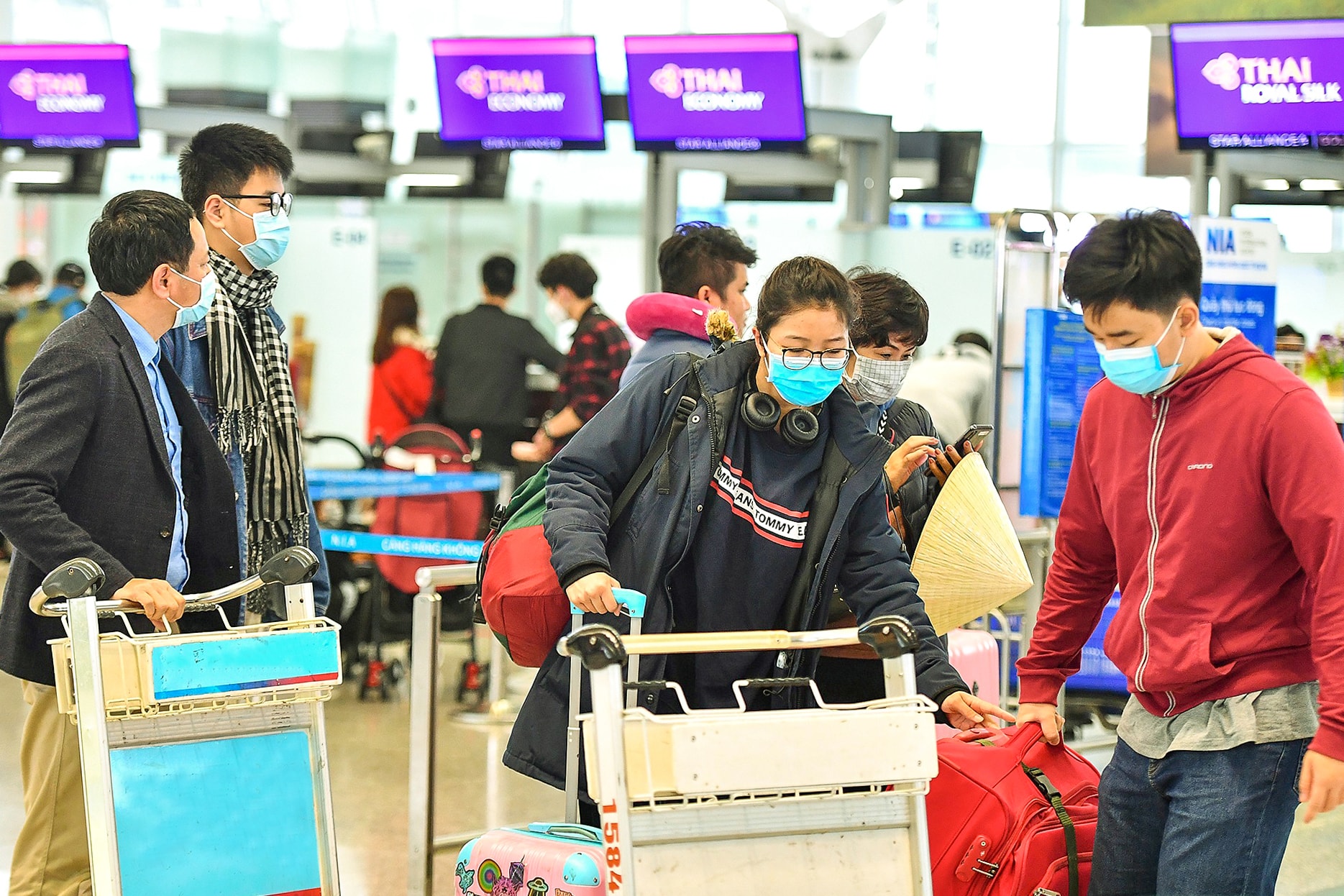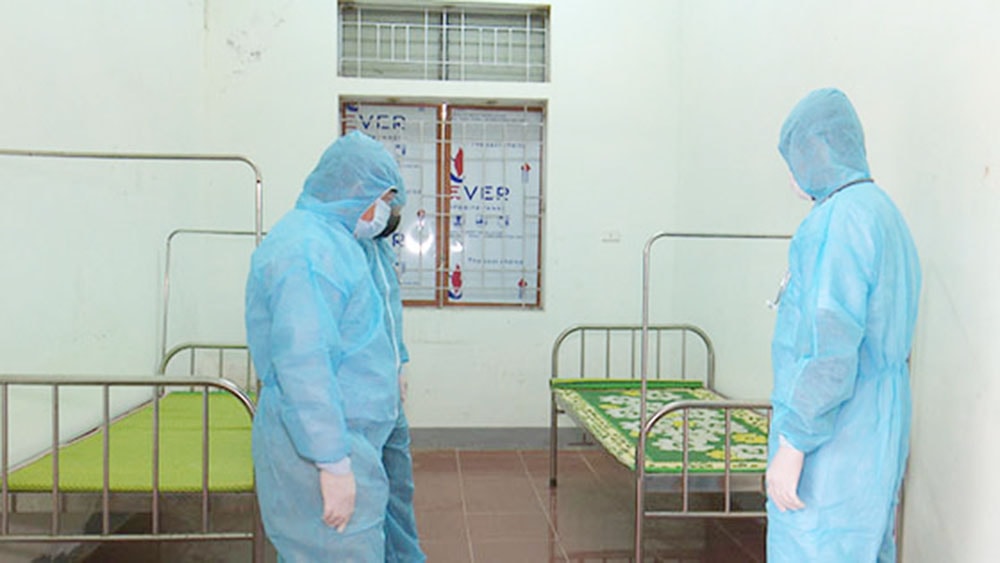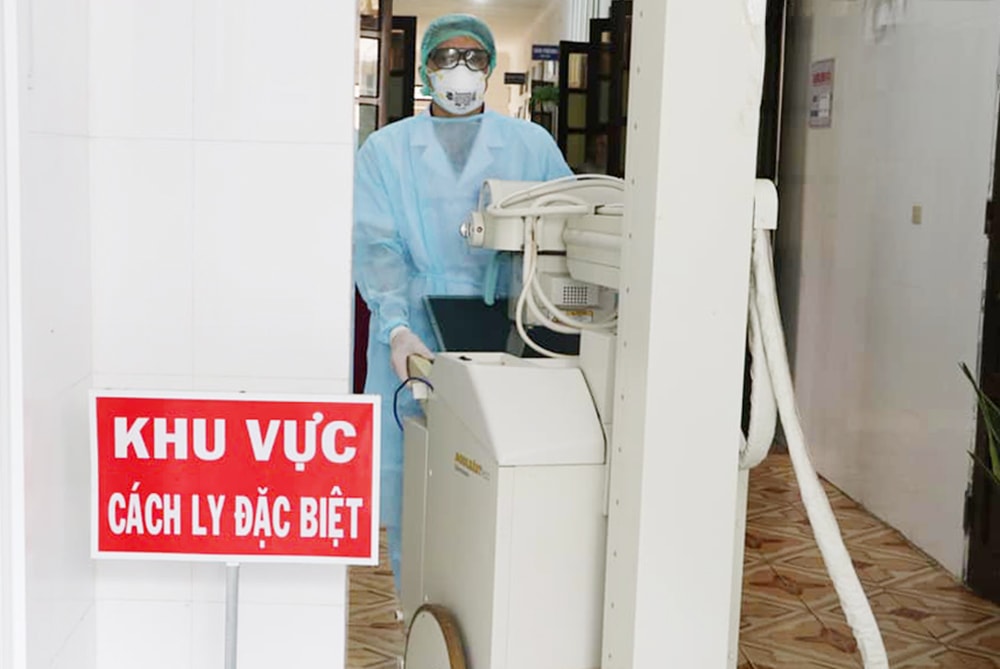The feelings of Nghe An workers in Korea: Half want to go home, half want to stay
(Baonghean.vn) - Over the past month, the Covid-19 epidemic has developed complicatedly and spread rapidly in Korea, with more than 7,800 people testing positive and thousands of others being quarantined. In that context, Vietnamese workers, including Nghe An workers working here, have also been greatly affected.
Living around the epicenter
Up to this point, Mr. Hoang Binh (Do Luong district) has worked in Korea for more than 9 years and only has a few months left before his labor contract expires according to regulations. During his time in Korea, he only worked at a company specializing in the production and supply of recycled plastic pellets and his job was stable with a good income. However, since the Covid-19 epidemic, the amount of goods imported to the company has decreased and he, like many other workers, has encountered difficulties as work has become less and less. Talking more about this, he shared: "Workers working in Korea, in addition to their salary, want to increase their income mainly by relying on overtime. But at this time, the amount of work at the company is small, so we are lucky to have regular work."
 |
| Nghe An leads the country in the number of people going to work abroad. Illustrative photo |
The place where Mr. Binh lives is Chungcheong Nam province in the west of Korea, about 200 km from the epicenter of Daegu. According to Mr. Binh, at the company, everyone is given free masks during working hours and the entire factory is disinfected every day. In the early days, there was a food shortage, but now life has almost returned to normal.
For Vietnamese workers like Binh, they usually go to the supermarket once a week; prices have increased but not much. The most difficult thing is buying masks and currently each person is only allowed to buy 2 masks a week at the pharmacy but must show their ID card. During the epidemic, some of Binh's friends have asked to return home but mainly in the epidemic area. In other areas, people still work and live normally because companies and factories have not closed.
From Ulsan city, about 300 kilometers from the epicenter of Daegu, Mr. Hoang Huy (Hung Binh ward, Vinh city) also updated people at home with the information they receive daily by phone from the Korean Ministry of Health. At the company he works for, workers passing through the gate are required to wear masks and use hand sanitizer; they must also wear masks and wash their hands regularly every day. Because of the epidemic, large gatherings must also be limited. For example, in the past, each lunchtime in the cafeteria could gather up to 1,000 workers, but now, lunchtime has been extended from 1 hour to 2 hours so that workers can be divided into different small groups.
Previously, workers could sit across from each other to eat, but now they can only sit next to each other, and the distance between them must be twice as far as before. During the meal, disposable gloves must be used to avoid contact with eating utensils...
 |
| Foreign workers check in at the airport. |
“We have also been advised that if we have signs of illness, we should not go to the hospital because the source of infection here is very high. Instead, we must stay at home and self-isolate and call the local health station, who will send someone to examine and check us daily. If the disease worsens, they will conduct a test and transfer us to the hospital if the result is positive,” Huy shared.
Anxious about the day of return
Up to this point, according to statistics, Nghe An currently has more than 6,000 workers working in Korea and is one of the localities with the largest number of workers in the country. For that reason, when hearing the news that the Covid-19 epidemic is breaking out in Korea, many families with children working here are extremely worried.
Ms. Nguyen Long Kim (Nghi Lien commune, Vinh city) just sent her husband back to Korea after Tet. However, not long after her husband arrived, the news of the epidemic spread, making her and her family extremely worried. “My husband works in a mountainous district in the North of Korea and according to him, it is quite far from the center, the number of infected people is not much. Currently, he says there is no need to worry because he knows how to protect himself, but I am still afraid that the epidemic will spread. Because if I am unfortunately infected with the epidemic and have to be quarantined, I don't know who will take care of me. Moreover, I also heard that medical care in Korea is quite expensive and if I have to go to the hospital, it will cost a lot of money,” Ms. Kim confided.
 |
| Facilities are ready for workers returning from epidemic areas in Cua Lo. |
In Nghi Hai ward (Cua Lo town), Ms. Nguyen Thi Thuy is also worried because if according to the original plan, this March her husband will return to Vietnam after more than 8 years of working in Korea. Now the plan is unknown when it will be postponed, because temporarily traveling between Korea and Vietnam is facing many difficulties due to the impact of the epidemic. Moreover, it is also very difficult to buy plane tickets because the demand for people to return is very high. "There are quite a lot of Vietnamese people where my husband lives and many of them plan to return home this time, especially those who have overstayed their jobs. Some people have quit their jobs and returned their houses, so it is very difficult and they have to temporarily live with friends and do not know when they will be able to return," Ms. Thuy shared.
Previously, according to information from the Department of Overseas Labor Management (Ministry of Labor, War Invalids and Social Affairs), the Immigration Department - Ministry of Justice of Korea also officially announced that "foreign citizens residing illegally in Korea who have symptoms related to the respiratory infection caused by the Corona virus (SARS-CoV-2) when coming to public health facilities for examination and treatment will not be prosecuted for illegal residence status and will not be deported".
However, for many workers working illegally in Korea, including a large number of workers from Nghe An, having to go to the hospital is unavoidable and unwanted. In that context, it is understandable that families with children working illegally in Korea are worried when the Covid-19 epidemic spreads rapidly. The family of Ms. Nguyen Thi Van in Nghi Hai ward (Cua Lo town) has a brother-in-law and sister-in-law living right in the epidemic area, said: "My brother-in-law's family lives and works in the epidemic center of Daegu and has announced that they are self-isolating at home, but we are also quite worried and regularly contact to update the situation."
 |
| Quarantine area for workers returning from epidemic areas. |
Mr. Nguyen Phi Hung - Head of the Department of Safety - Labor Export - Employment (Department of Labor, Invalids and Social Affairs) said: "The Department of Labor, Invalids and Social Affairs has issued Decision No. 94/QD- SLĐTB&XH dated February 3, establishing a standing unit for Covid-19 prevention and control, including assigning focal officers in charge of disease prevention and control and providing a permanent phone number of the industry to urge, support and update the situation of workers returning from abroad to localities in the province".
